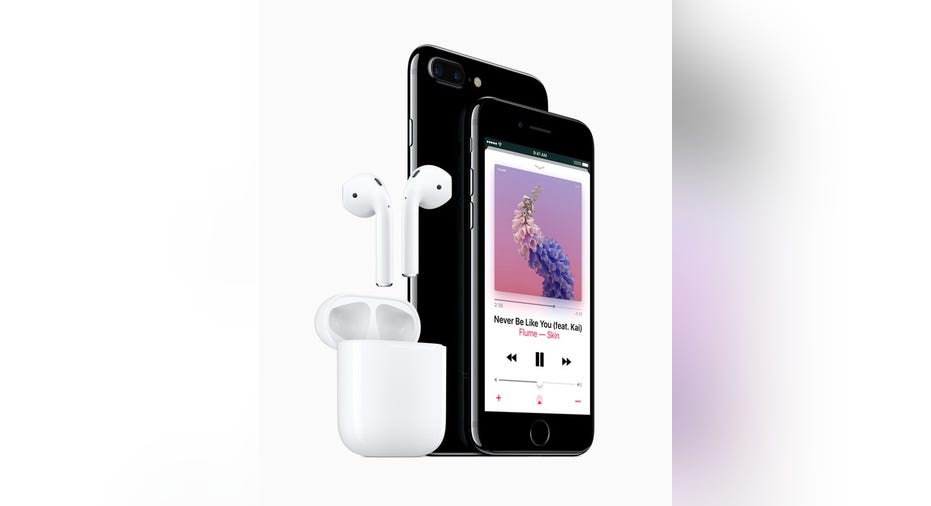Wireless Promotions Could Be Key to the iPhone 7's Success

After sales of Apple's (NASDAQ: AAPL) iPhone 6s and iPhone 6s Plus missed expectations last year, most analysts and pundits didn't have high hopes for the new iPhone 7 and iPhone 7 Plus. But it's starting to seem that the broad consensus was wrong for a second straight year.
Some of that has to do with the growth of the iPhone user base, which is as much as 50% larger than it was two years ago. Some of it relates to fortuitous timing -- the new iPhones launched just as stories of exploding Samsung Galaxy Notes started to go viral. However, better promotions from wireless carriers could be the biggest impetus for customers to buy the new iPhones.
Preorders surge
Soon after Apple began preorders for the iPhone 7 and iPhone 7 Plus, AT&T (NYSE: T) stated that its preorders were up year over year. That's good news, as AT&T has a huge iPhone subscriber base, due to its history as Apple's exclusive U.S. carrier partner until early 2011.
The iPhone 7 and iPhone 7 Plus have been in high demand so far. Image source: Apple.
Meanwhile, preorders leaped higher at industry disruptors Sprint (NYSE: S) and T-Mobile (NASDAQ: TMUS). Sprint reported that iPhone preorders were up 375% year over year in the first three days. T-Mobile said that its iPhone 7 series preorders were almost four times higher than for any other iPhone launch.
The only company to rain on Apple's parade was No. 1 wireless carrier Verizon (NYSE: VZ). While AT&T, Sprint, and T-Mobile were trotting out impressive statistics, Verizon stated a few days after preorders began that the iPhone 7 launch was in line with typical numbers for a new iPhone model.
However, it now appears that Verizon's iPhone order activity was stronger than management had implied. At a conference on Thursday, Verizon CFO Fran Shammo stated that the carrier had seen "some increase" in iPhone volumes compared to 2015. He attributed the strong sales to unprecedented promotional offers.
U.S. carriers roll out the discounts
T-Mobile kicked off the most recent carrier price war by offering customers a free 32GB iPhone 7 with the trade-in of a working iPhone 6. Its goal was to use the high-profile launch to poach customers from its rivals while moving existing customers up to more expensive service plans.
AT&T, Sprint, and Verizon quickly copied T-Mobile with similar offers. Shammo believes that the "free iPhone" offers are artificially boosting sales. After the promotions end, he expects sales to drop off, ending up comparable to last year's volumes.
U.S. carriers have been offering the iPhone 7 for free with an iPhone 6 trade-in. Image source: Apple.
Indeed, T-Mobile is ending its free iPhone offer this weekend. All of the other carriers are expected to follow suit soon.
However, we could see new carrier iPhone promos in the coming months, particularly as supply improves. Apple posted huge sales numbers in the first six months after the iPhone 6 launch two years ago. That means many iPhone users will reach the end of their two-year contracts or two-year installment plans soon. Thus, it's an ideal time for carriers to try to steal their rivals' customers.
It's not just the U.S.
Even outside the U.S., carrier promotions could boost sales of the iPhone 7 and iPhone 7 Plus. For example, in China -- Apple's second-biggest market after the U.S. -- China Unicom is subsidizing 49% of the cost of a new iPhone 7. Meanwhile, China Telecom is subsidizing 40% of the cost.
As in the U.S., market share battles appear to be driving this discounting behavior. Both carriers are trying to avoid falling too far behind industry giant China Mobile, particularly when it comes to 4G subscribers.
Apple remains the world's premiere smartphone brand. Samsung's "exploding phone" scandal has further solidified Apple's supremacy. As a result, iPhone promotions are key tools in wireless carriers' market share battles. This favorable positioning could continue to lift Apple's revenue and profit for the foreseeable future.
A secret billion-dollar stock opportunity The world's biggest tech company forgot to show you something, but a few Wall Street analysts and the Fool didn't miss a beat: There's a small company that's powering their brand-new gadgets and the coming revolution in technology. And we think its stock price has nearly unlimited room to run for early in-the-know investors! To be one of them, just click here.
Adam Levine-Weinberg is long January 2017 $85 calls on Apple and short January 2017 $110 calls on Apple. The Motley Fool owns shares of and recommends Apple and is long January 2018 $90 calls on Apple and short January 2018 $95 calls on Apple. The Motley Fool recommends China Mobile, T-Mobile US, and Verizon Communications. Try any of our Foolish newsletter services free for 30 days. We Fools may not all hold the same opinions, but we all believe that considering a diverse range of insights makes us better investors. The Motley Fool has a disclosure policy.



















